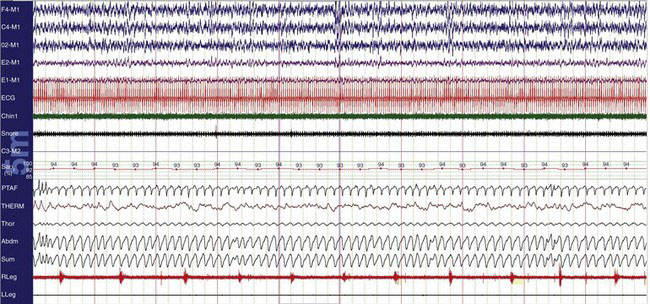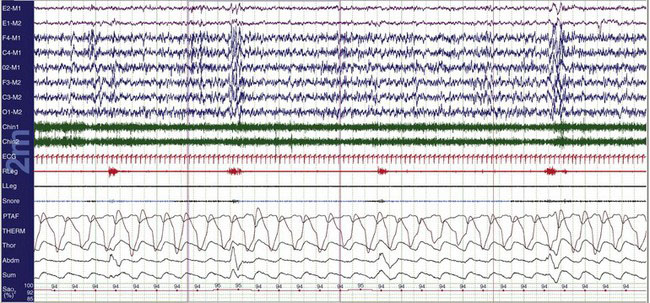Section 9 Movement Disorders
A 58-year-old Air Force general is referred for management of insomnia. He complains of difficulty falling asleep at bedtime, especially when he is flying at night from base to base. He finds that he worries about the various military operations around the world involving the Air Force and he cannot turn his mind off. He has participated in military operations and often thinks about the time when his airplane was hit by antiaircraft fire and he was forced to return to base and make an emergency landing. He also finds that as he is trying to fall asleep in the passenger section he feels fidgety and, to relieve the sensation, he has to get up to walk around. He sometimes has the same sensation when he is acting as a copilot in the cockpit of aircraft. He has had difficulty with sleep for about 30 years but is seeking help now because his inability to sit in the cockpit has worsened recently and he is concerned that he may be developing a serious neurological problem. His mother has the same problem and also has had difficulty with sleep her entire life. He snores his but has never been observed to become apneic. His Epworth Sleepiness Scale score is 2. His BMI is 25. He had a complete physical and screening blood tests 4 months before and was told all of his numbers were normal. He takes low-dose aspirin for heart disease prophylaxis.
Going Crazy in the MRI Scanner
Looking for Sleep Apnea, Finding Something Else
A 67-year-old woman, with a BMI of 34 and symptoms of sleep-onset insomnia, early-morning awakening, snoring and, an Epworth Sleepiness Scale score of 9, has a sleep study ordered by her family doctor because of suspected obstructive sleep apnea. Her husband states that she moves the entire night and that it is like sleeping with a twitching fish. In the sleep study the sleep latency was 90 minutes, a value that is typical for this patient. Leg EMG did not show excessive activity during the initial wake period. Total sleep time was 5 hours. A 5-minute fragment of her study is shown in Figure 9.1–1, and the patient had similar findings while she slept the entire night.
Right Test for the Wrong Reason
A 45-year-old otherwise healthy woman falls asleep quickly. She wakes up several times during the night, and has symptoms of restlessness in her legs and arms that are relieved by movement. Sometimes she walks to relieve the restlessness in her legs. There is no history of snoring. The Epworth Sleepiness Scale score is 8. The patient states that her family doctor wanted her to have a sleep study because he thought she had restless legs.
Stay updated, free articles. Join our Telegram channel

Full access? Get Clinical Tree




